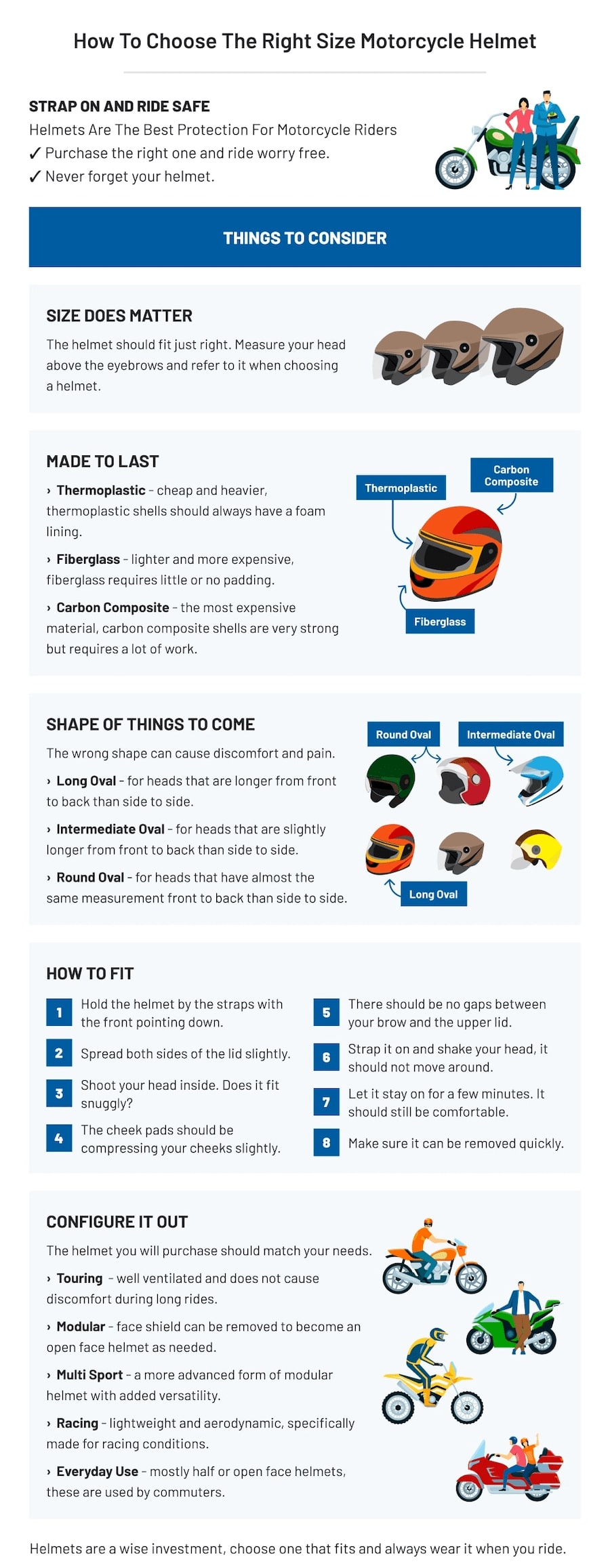Do You Have to Wear a Motorcycle Helmet in Atlanta, GA?
November 22, 2022
When on a motorcycle, it is important to take extra precautions to protect yourself from a traffic accident. Every time a motorcyclist gets into an accident, they are 29 times more at risk of a fatality than a driver of an automobile. Motorcyclists are also at a higher risk of getting injured. Because of this, there are laws created to protect bikers from getting harmed while on the road.
To get more information on motorcycle helmet laws in Atlanta, GA, you can speak to a reliable attorney. The rules regularly change and can also impact your settlement if you were recently injured. If you suffered damages because of another’s negligence, speak to motorcycle accident attorneys today to find out if wearing a helmet influences your case. Call Henningsen Injury Attorneys for a free consultation.
Helmet Laws In Atlanta, GA
Not only is it required to wear a helmet in Georgia, but the helmet must be DOT approved. Georgia law § 40-6-315 requires protective headgear for motorcyclists. The State has a list of approved headgear for motorcyclists to review and follow after publishing the §570-13-02 rule.
When on public grounds, the motorcyclist has to wear headgear. However, this doesn’t apply to anyone in a motorized cart or enclosed cab. This law also doesn’t apply to anyone driving a three-wheeled motorcycle for agricultural farm work.
Why Helmet Laws Are Necessary
Many may argue that wearing a helmet is a personal choice, but it provides vital protection during accidents. According to the Insurance Institute for Highway Safety, helmets are 37% more efficient at protecting bikers from dying after a collision. Helmets also reduce the chance of severe head injury and brain damage. Protective headgear can also reduce neck injuries, which can result in long-lasting pain. Riders who don’t wear a helmet are three times more likely to experience traumatic brain injuries than those who wear helmets.
What Are The Penalties For Not Wearing A Helmet?
Motorcycle accidents cause more than 5,000 deaths annually and many more injuries.The penalties for not wearing a helmet include the following:
A Fine of $1000 Or Less
Depending on the severity of the infraction, you will have to pay a fine of up to $1,000. This amount can change based on how you were ticketed, if it caused an accident, and if anyone was injured or harmed.
Jail Time
Getting ticketed for not wearing helmet results in a misdemeanor. You may be required to go to jail for up to a year if caught riding a motorcycle without a helmet. The jail time can increase if you harmed someone in an accident while riding without a helmet.
Community Service
After receiving a citation, you may be required to attend community service depending on what the judge decides at your trial.
How A Helmet Affects Your Settlement
When you’ve been in a motorcycle accident, your attorney will need to know if you were wearing a helmet during the collision. Settlement compensation is awarded based on the severity of your injuries. The more extreme your injuries, the more expensive your damages will be. This is especially the case for catastrophic injuries that result in wounds that require surgery and lengthy physical therapy sessions.
Not wearing a helmet increases your risk of getting into a life-threatening situation. Your injuries may incapacitate you and make you unable to work. If you get disabled, you’ll get paid a monthly stipend according to state and government laws. If your insurance policy doesn’t cover your medical care, the state may have to pay your expenses.
You can still file a lawsuit against the at-fault driver for causing your motorcycle accident. The only issue is that they can form a rebuttal if you weren’t wearing a helmet. They may argue that had you been wearing a helmet, you wouldn’t have been so badly injured.
Despite this, your attorney can still prove that the other party was negligent. Because you weren’t at fault, you can still receive compensation. However, your settlement may be heavily reduced because you weren’t wearing a helmet.
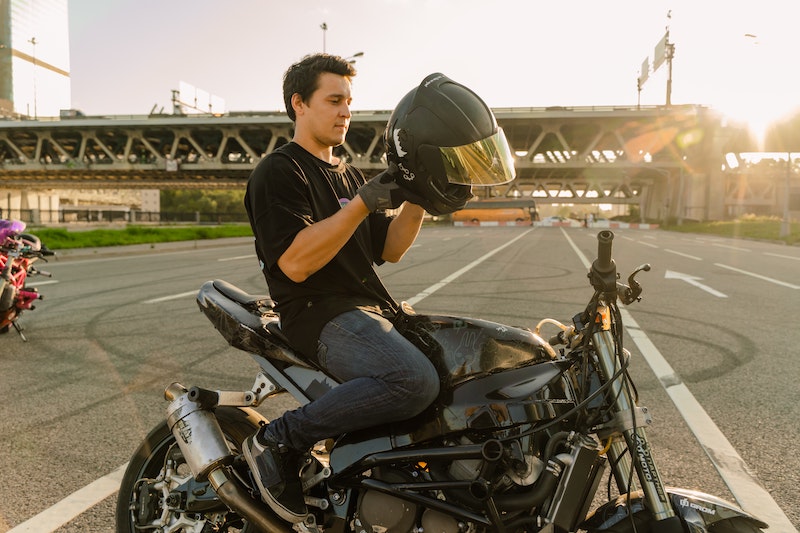
Other Safety Gear For Motorcyclists
When riding a motorcycle, you should wear more than just a helmet so that you can be prepared for the worst-case scenario. Other safety gear includes the following:
Gloves
You will need gloves made of strong materials that will stay intact if you fall. Some gloves have sliders that protect your palms if you slide down the road. These gloves can also help absorb the force of the fall.
Jackets
Every motorcyclist should have a high-quality jacket in their collection. Back and chest protectors, elbow and wrist guards, and other safety features are some of the features offered in biker jackets. You should get a jacket with a waterproof shell and enough ventilation.
Boots
If you fall from your bike or are involved in an accident, your boots will protect your feet and ankles. A motorcyclist requires a boot with a sturdy sole and sufficient ankle support, which are preferably weatherproofed.
Durable Clothing
A common saying is to dress for the slide, not the ride. Wearing sturdy gear will protect you from the worst of road rash. Motorcycle-specific apparel may feature padding made of Kevlar, premium leather, and plastic.
Preparing Your Motorcycle
There are many ways that you can improve your motorcycle to help prevent motorcycle accidents. Some of the ways you can do this include the following:
Antilock Braking System
Antilock braking systems (ABS) use wheel-speed sensors to detect when the wheels lock up during braking. They release and reapply brake pressure a few times per second to prevent a crash. It keeps the motorbike stable when you are rounding tight corners or during an emergency high-speed braking maneuver.
Inspect Your Motorcycle
Before you ride, it’s a good idea to check your bike to make sure it is as safe as possible. Examine your brakes, fuel, oil, tire pressure, mirrors, handlebars, turn signals, taillights, and headlights.
Adaptive Headlights
As you drive around dark corners, standard older-model headlights aren’t the best at illuminating the road ahead. Adaptive headlights use electronic sensors and turn when you round a corner.
Automatic Clutch And Shift
New motorcycle riders are more likely to get into an accident, and often have a more difficult time adjusting to the manual clutch and shift gears on their bikes. Most bikes require you to be able to shift gears and use a clutch. However, manufacturers are already releasing motorcycles with automated clutch and shift mechanisms. SO new riders won’t have to spend much time learning how to change gears.
Electronic Tire Pressure Monitors
Low tire pressure can make it more difficult to operate your bike and also increase the risk of a motorcycle accident. The electronic tire pressure system monitors when the pressure is low so you know when to inflate the tires.
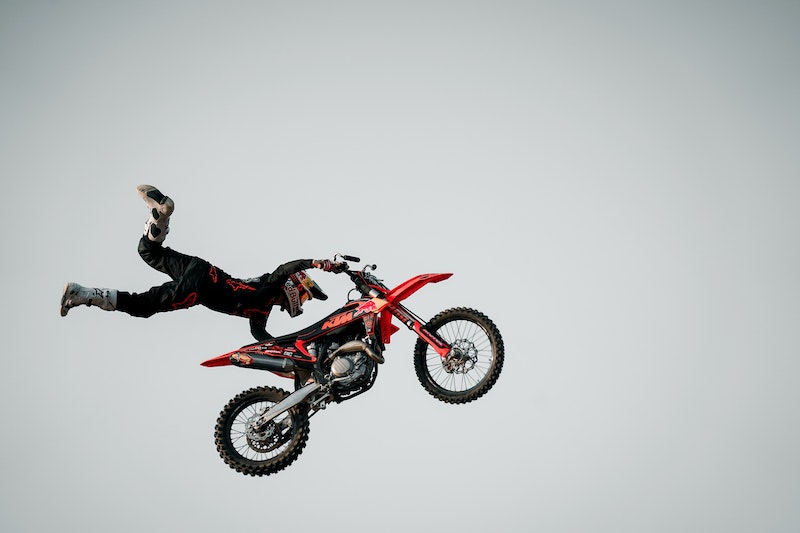
Common Motorcycle Injuries
Some of the most common motorcycle injuries include the following:
Traumatic Brain Injury
Head injuries are common in a motorcycle accident, even with a helmet, though they are far worse without one. The impact of the head on hard surfaces causes the brain to hit the walls of the skull. This can cause a concussion, hematoma, or hemorrhaging, all of which have long-term consequences. You might also experience a penetration injury which happens when an object pierces the brain. When the brain tissue gets injured, it can cause long-term cognitive problems.
Spinal Cord Injuries
You may deal with spinal cord wounds such as ruptured discs, slipped discs, herniated discs, pinched nerves, hemiplegia, or paraplegia. The severity of your spinal cord injury depends on the location of where the injury occurred. You can suffer from minor backache and radiating pain because of the spinal cord injury, or paralysis due to severed spinal nerves.
Internal Organ Injuries
When you hit the ground, there may be objects that can pierce your protective gear and rupture your organs. Internal bleeding can be fatal and requires urgent medical attention. For example, if your lungs are punctured, you may suffer pneumothorax. Injuries to other organs like the heart can also be incredibly dangerous. Internal bleeding takes a long time to heal and can also put you at risk of infection.
Fractures And Broken Bones
You are likely to experience fractures in some parts of your body after a motorcycle accident. This is common in the wrists, hands, pelvis, and hips. You can also experience fractured or broken ribs, which can make it extremely painful to move.
Lower-Extremity Injuries
Because your legs and feet are closest to the ground, you could suffer injuries to your thighs, knees, calves, ankles, feet, and toes. Leg and foot injuries can cause temporary or permanent disability.
Road Rash
When you slide across the pavement, it can cause road rash. Road rash injuries are very painful and can cause heavy scarring.
Burns
In some cases, you can suffer from burn injuries if your bike or the other motor vehicle combusts after a motorcycle accident. You can experience first, second, or third-degree burns.
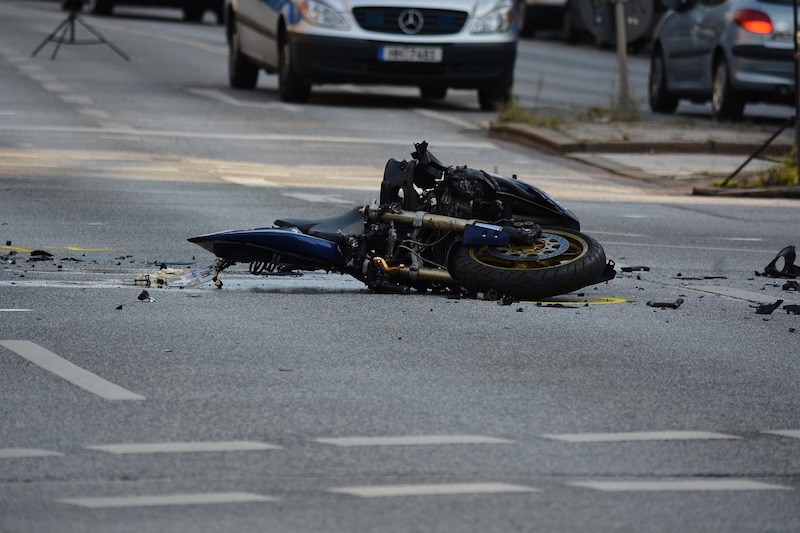
Damages From a Motorcycle Accident
When working with a motorcycle accident attorney, you can seek non-economic and economic damages, which include the following:
Medical Bills
Any medical expense you had to pay because of your motorcycle accident will be a part of your settlement. You can include your medical bills even if they are ongoing. These include medical examinations, imaging scans, surgeries, lab tests, and more. Medical devices such as casts, crutches, wheelchairs, and more will also be included in the cost. If you require physical therapy, chiropractic therapy, prescription medicine, and even transportation, these will be covered in your compensation.
Lost Income
After you’ve been wounded, you might have to take time off work. The average amount you would normally make will be included in your settlement and any amount you expect to make in the future.
Pain and Suffering
When you are suffering from heavy injuries, you may also be dealing with negative emotions. For example, you might be suffering from PTSD, depression, anxiety, guilt, shame, and more.
Property Damage
Your motorbike may need repair or replacement after in an accident. If your insurance policy doesn’t cover all of your property damage, your attorney can calculate your property damage compensation for you.
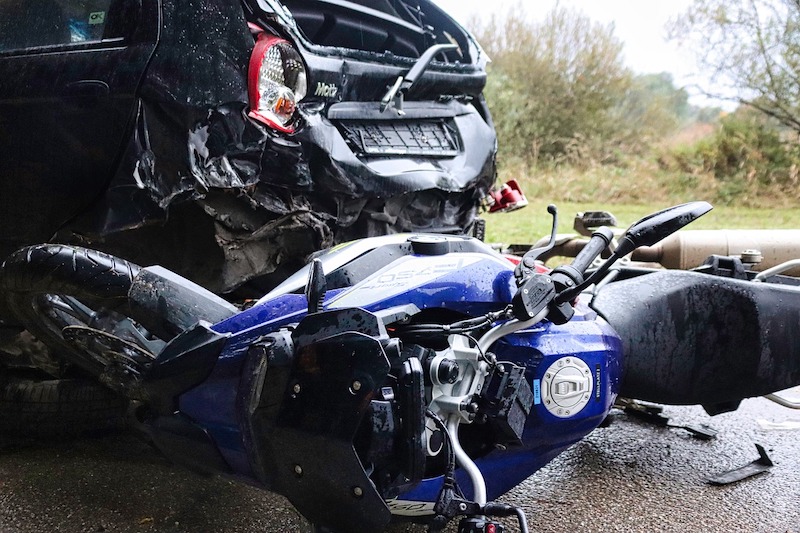
What To Do If You Were In A Motorcycle Accident
If you didn’t wear a helmet or your helmet was defective, the settlement amount you receive might change. After an accident, you should reach out to a motorcycle attorney to get a settlement claim initiated. They can investigate your traffic accident to find out who was liable for your damages. If you are partially at fault for your injuries, it can result in a deduction from your total settlement.
In the state of Georgia, the law of comparative negligence applies to your settlement claim. This means that if you contributed to less than 50% of the motorcycle accident, you could still receive compensation. However, if you contributed to more than 51% of your damages, then you will be considered at fault and will be denied compensation. If you break any traffic laws regarding wearing a helmet, this can affect the amount of compensation you receive. A reliable and knowledgeable attorney can help you regardless of the situation.
For more information, speak to us to learn about your claim. We work on a contingency fee basis and don’t require you to pay upfront. Reach out to Henningsen Injury Attorneys today for a free consultation.

